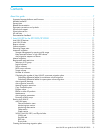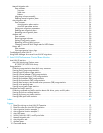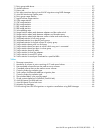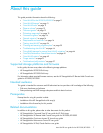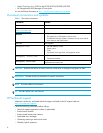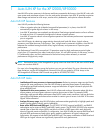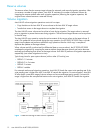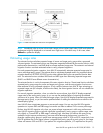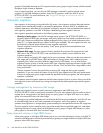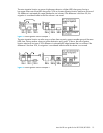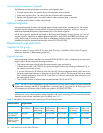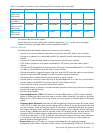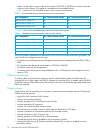
Auto LUN XP user guide for the XP12000/XP10000 11
1 Auto LUN XP for the XP12000/XP10000
Auto LUN XP monitors resources in disk arrays and hosts connected to disk arrays. Auto LUN XP works with
open system and mainframe volumes. You can analyze the information Auto LUN XP provides to optimize
data storage and retrieval on disk arrays, resolve activity bottlenecks, and optimize volume allocation.
Auto LUN XP features
Auto LUN XP provides the following features:
• When a migration plan (set of detailed user-specified parameters) is in place, Auto LUN XP
automatically migrates logical volumes in disk arrays.
• Auto LUN XP operations are completely non-disruptive. Data being migrated remains online to all hosts
for read and write I/O operations throughout the volume migration process.
• Auto LUN XP supports manual volume migration operations and estimates performance improvements
prior to migration.
Auto LUN XP begins by obtaining usage statistics about physical hard disk drives, logical volumes,
processors, and other resources in disk arrays. Then, using manual or automatic migration, Auto LUN XP
balances the workload among hard disk drives, logical volumes, and processors to improve system
performance.
Use Performance Control XP to ensure that I/O operations requiring high performance receive higher
priority than I/O operations from other, lower-priority hosts. You can set the priority of disk arrays, monitor
I/O and transfer rates, and limit performance of less-critical arrays when necessary to maintain
performance of high-priority arrays.
NOTE: Partition-level users in the StorageAdmins group cannot use Auto LUN XP, but users with full array
access can use Auto LUN XP.
For users in the StorageAdmins group, the functions you can use are limited. For more information about
these limitations, see the HP StorageWorks Command View XP user guide for XP Disk Arrays or the
HP StorageWorks XP Remote Web Console user guide for XP12000/XP10000.
Auto LUN XP tasks
• Load balance disk array resources to improve performance. Balancing resource usage can significantly
improve disk array performance. Use Auto LUN XP data to optimize several areas of performance,
including front-end and back-end processor usage and allocation of logical volumes to physical disk
drives and RAID level.
• Optimize disk drive access patterns. Auto LUN XP collects and analyzes information about disk drive
access patterns and can migrate volumes to optimize host access to data. For example, RAID-1
technology might provide better performance than RAID-5 under certain conditions, and one disk drive
type might provide better performance than another for certain types of access. Auto LUN XP fine-tunes
logical volume allocation.
• Analyze disk array usage. Auto LUN XP displays performance data graphically to highlight peaks and
trends. Use the graph to identify activity bottlenecks.
• Better utilize RAID levels and HDD types. The XP12000/XP10000 supports both RAID-1 and RAID-5
technologies and a mixture of RAID-1 and RAID-5 parity groups. The XP12000/XP10000 also supports
several types of hard disk drives (HDDs) and allows a mixture of HDD types within each disk array
domain to provide maximum flexibility in configuration. Auto LUN XP takes into account RAID level and
physical HDD performance of each parity group, enabling reallocation of logical volumes and
optimization with respect to both RAID level and HDD type. The proper combination of RAID level and
HDD type for logical volumes can significantly improve disk array performance.



